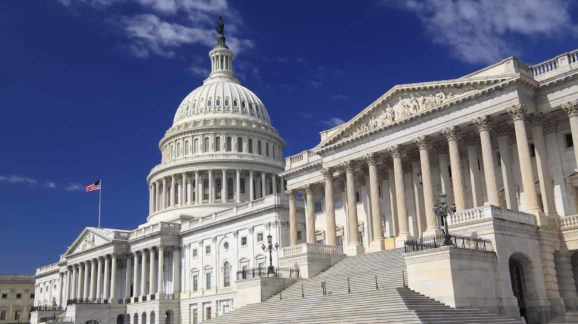House passes sensible regulatory reform bills to shrink power of the administrative state

Earlier today, the House passed 220 to 211 the Separation of Powers Restoration Act (SOPRA) sponsored by Rep. Scott Fitzgerald (R-WI). Yesterday, the House passed the REINS (Regulations from the Executive in Need of Scrutiny) Act from by Rep. Kat Cammack (R-FL) 221 to 210.
The REINS Act would require Congress to vote on all new major regulations and SORPA would amend the Administrative Procedure Act to require courts to conduct a de novo review of all relevant questions of law and regulation when they are called into question.
Today’s passage of SOPRA was bipartisan as Rep. Henry Cuellar (D-TX) joined House Republicans in voting for the bill. Similarly, yesterday’s passage of the REINS Act was too as Rep. Jared Golden (D-ME) crossed party lines and voted aye.
Together, these two common-sense bills would do much to limit the persistent growth of the federal bureaucracy and reassert Congress’s Article I power over lawmaking.
CEI Fred L. Smith Fellow in Regulatory Studies Wayne Crews said:
In a bid to restore congressional accountability over the sprawling regulatory state, the House of Representatives today passed the Regulations from the Executive in Need of Scrutiny (REINS) Act from Rep. Kat Cammack (R-FL). Simply, REINS would require Congress to approve major federal agency regulations before they go into effect.
Passage of the REINS Act is particularly important given the recent enactment of COVID-related spending bills and other legislation on infrastructure, inflation, and tech manufacturing which are soon poised to unleash a slew of unforeseen mandates on small businesses and state and local governments. Today’s vote is the first time the REINS Act has passed as a standalone bill in the 118th Congress, but it was included in the House GOP’s Limit, Save, Grow Act that sought to address the debt ceiling and implement certain government reforms.
The Senate version of REINS was introduced by Sen. Rand Paul (R-KY) earlier this year but has yet to move. During the 115th Congress, Paul’s bill passed the Homeland Security and Governmental Affairs Committee but was not brought to the floor. Should the Senate once again find itself unable to advance the legislation, lawmakers should consider some of the other bipartisan regulatory reform bills still in play. A good place to start would be the Guidance Out Of Darkness (GOOD) Act and the Guidance Clarity Act. These bills are particularly necessary in the wake of President Biden’s misguided April 2023 Executive Order 14,094 “Modernizing Regulatory Review” that lowers the threshold for which rules are subject to scrutiny and review.
Nevertheless, the REINS Act ranks among the best tools to restore congressional oversight over the administrative state and demonstrates that there is a large number of lawmakers interested in curtailing the power of agency bureaucrats. The time for a restoration of Congress’s Article I powers has long since arrived and this will certainly become more clear in the coming years with a regulatory torrent on the horizon. Don’t refrain from REINS.
CEI Senior Economist Ryan Young said:
America has a separation of powers problem. Presidential overreach and unilateral regulating are now bipartisan traditions. The REINS Act would give Congress a check and balance against an executive branch that seems to think it can do whatever it wants.
SOPRA would empower the judicial branch to better do its job as a counterweight to executive branch excesses.
Hopefully the Senate will see fit to pass both bills as well.
More from CEI: